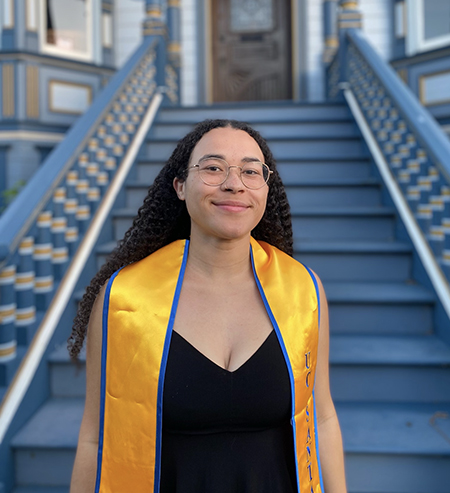When Serena Campbell (Merrill ’23, sociology, critical race and ethnic studies) arrived at UCSC, it transformed her environmental worldview. Now, Campbell is working towards transforming UCSC’s own environmental research and pedagogy through her work with the Building Belonging Program.
Campbell began her time at UCSC as a double-major in environmental studies and sociology. However, a class within the History of Art and Visual Culture Department injected Campbell’s approach to environmentalism with intersectional concepts.
“When I came here, I didn't know about critical approaches to environmentalism: I only knew about the mainstream,” said Campbell. “When I took the course Climate Justice Now, it opened up my eyes to there being other approaches to environmentalism that center the experiences and the expertise of people of color, and actually work towards addressing climate issues and naming structural causes of these issues.”
The Building Belonging Program is part of UCSC’s Institute for Social Transformation, which supports research projects, such as Identifying Critical Environmental Work and Needs on Campus, managed by Professors Flora Lu, Emily Murai and Professor Hillary Angelo. The Institute for Social Transformation’s Director of Operations, Evin Knight, is proud of the work Campbell has been able to achieve through the program.
“Serena and her work are stellar examples of the change we hope to achieve through the Institute for Social Transformation,” Knight said. “The Building Belonging Program provides undergraduate students with the unique opportunity to participate in faculty mentored service-learning and research projects. In Serena’s case, she took her project and propelled it into something transformative.”
Since the Building Belonging Program launched in 2020, the institute has awarded over 340 student scholarships–totalling more than $500,000 going directly to students–supporting over 130 faculty research projects.
Cultivating a Critical Environmentalism Network
The Building Belonging Program inspired Campbell to switch to a double major in sociology and critical race and ethnic studies, where she learned more about critical approaches to environmentalism. Campbell interviewed 58 faculty and staff across campus on their research, and compiled her findings into a research project, with the goals of making a network between researchers. On the advice of Professor Hillary Angelo, Campbell transformed her research into a senior thesis entitled “‘The university needs to listen: Moving from Mainstream to Critical Environmentalism at UC Santa Cruz.”
Through her interdivisional research and interviewing, Campbell came to an impactful conclusion:
“There's definitely a lot of faculty on campus who have interest in doing critical environmental work as I found through the research I conducted, but there isn't a lot of institutional support for this work to be done,” she said. “What happens now is that there are so many faculty and staff who are interested in critical environmentalisms, but because of departmental silos or physical boundaries across campus, it's hard to meet these people and form these collaborations.”
After a semester of research, Campbell found a dire need for collaboration across departments and fields of study: UCSC has multiple professors and researchers focusing on the same subject of critical environmentalisms, but often working in academic isolation. Campbell, in her research, even discovered professors working on duplicate projects without being aware of each other's efforts.
With this discovery, Campbell saw a clear problem and came ready with a corresponding solution from her research: a comprehensive critical environmentalism network.
The network is a place where students, staff, faculty, and community members can access this information. They can find out what's happening on campus, and what people are working on. The network can provide connection for the otherwise dispersed critical environmental research at UCSC, and Campbell hopes it brings researchers together across environmental disciplines.
“The network encourages interdisciplinary collaboration, because right now a lot of funding goes towards the hard sciences as opposed to social sciences or arts, which aren't considered as important within environmental issues,” Campbell said. “But their views are important: they inspire and lead towards activism, which is the way to create change for these environmental issues.”
Campbell’s network is accessible now on the Sustainability Office website, which is open to all. The project contains a comprehensive listing of both faculty involved in critical environmentalism, as well as Critical Environmentalist campus initiatives, organizations, and centers and relevant courses to Critical Environmentalisms. From this network, Campbell hopes to expand into an eventual physical space.
“Hopefully, this network leads towards a cluster or center for critical environmentalism on campus. There would be socializing events, which people indicated as a need.”
Campbell knows the importance of such connections firsthand—it’s what led her to the Building Belonging Program, after all.
“The Building Belonging Project really opened my eyes to research opportunities on campus,” she said. “I was able to learn about so many more opportunities for involvement on campus related to critical approaches to environmentalism, and learn about more courses by interviewing the faculty and staff members.”
Through resources like the critical environmentalism network, Campbell hopes that students will expand their studies beyond the classroom, and look towards research opportunities and new courses to expand their mindset.
“There's all these opportunities that connected me to faculty and staff on campus, which opened my eyes to how much more there is to pursue at UCSC,” she said. “You can really diversify your educational experiences by doing more on campus than just classes.”



